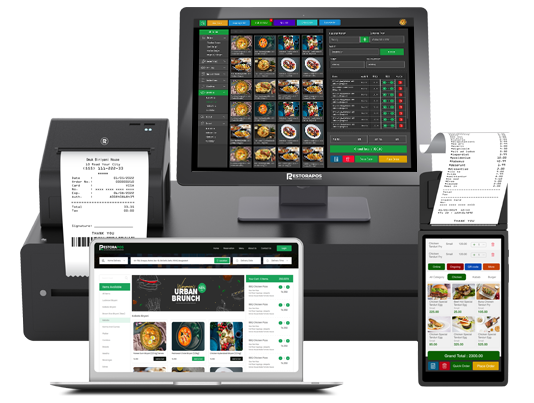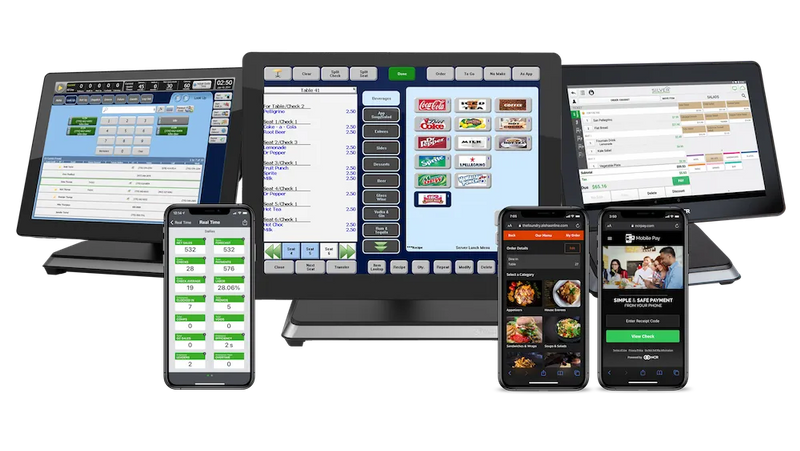Comprehending the Significance of POS Software in Modern Retail Workflow
In today's retail landscape, the function of POS software has ended up being significantly substantial. These systems have transformed from fundamental cash registers to diverse devices that boost numerous elements of procedures. They not only streamline transactions yet likewise offer understandings that can form organization techniques. Comprehending how these systems effect client experience and supply monitoring is crucial for any type of retailer seeking to remain competitive. The implications of these developments necessitate further exploration.
The Development of POS Software: From Transaction Handling to Comprehensive Solutions

Enhancing Customer Experience Through Advanced POS Features

Enhancing Stock Management With Integrated POS Systems
Integrated POS systems play an important role in streamlining inventory administration by automating procedures that generally required substantial hand-operated initiative. These systems allow merchants to track supply levels in actual time, getting rid of inconsistencies that often develop from hand-operated stock matters. With attributes such as barcode scanning and automatic supply replenishment notifies, companies can keep ideal stock levels without overstocking or stockouts.Furthermore, integrated POS systems help with precise forecasting by examining historic sales information, allowing retailers to make enlightened investing in choices. This predictive capability aids companies adjust to transforming consumer demands and seasonal trends much more effectively.Additionally, the centralization of inventory data across numerous sales networks boosts visibility, allowing merchants to handle their supply more effectively. Eventually, the combination of POS systems into supply monitoring streamlines operations, lowers human mistake, and adds to enhanced earnings.
Real-Time Sales Tracking and Coverage for Informed Decision-Making

Exact inventory management lays the groundwork for effective sales tracking and reporting. Real-time sales tracking enables stores to check sales performance as it takes place, providing immediate understandings into consumer getting patterns and trends. This ability permits services to react swiftly to fluctuations in demand, maximizing supply degrees and decreasing overstock or stockouts.Moreover, integrated POS systems facilitate the generation of thorough records, highlighting key metrics such as sales by category, time durations, and specific products. Such reporting capabilities encourage retailers to make data-driven choices, identifying effective techniques and locations needing improvement.
The Role of POS Software in Client Relationship Administration
POS software plays a necessary duty in improving client connection management by making it possible for stores to apply individualized marketing strategies. By evaluating customer information, services can customize promotions and interactions to meet private preferences. In addition, these systems facilitate the development of boosted commitment programs that urge repeat organization and reinforce consumer involvement.
Personalized Marketing Strategies
As retailers progressively seek to boost client loyalty and engagement, customized advertising and marketing methods have actually emerged as a crucial part of efficient client partnership management. POS software plays an essential duty in this procedure by collecting and evaluating client information, making it possible for retailers to customize advertising efforts to private preferences and purchasing actions. By leveraging understandings from purchase histories, merchants can create targeted promotions and individualized communications that resonate with customers, cultivating a much deeper link. Additionally, the integration of POS software with consumer connection management systems enables seamless monitoring of customer interactions, making sure that advertising and marketing methods continue to be pertinent and timely (Restaurant POS Software). This data-driven technique not only improves customer contentment but likewise drives sales and motivates repeat business, strengthening the store's market setting
Enhanced Loyalty Programs
Sellers are increasingly identifying the relevance of commitment programs in promoting long-term consumer partnerships and improving total involvement. POS software plays an important function in the advancement and administration of these programs, permitting merchants to track customer purchases, preferences, and actions successfully. By leveraging data analytics, services can develop personalized benefits and rewards that resonate with specific consumers, thus boosting engagement in commitment programs. In addition, POS systems enable seamless integration with mobile applications and digital systems, facilitating very easy access to benefits and promotions. This not only improves client contentment but also drives repeat business. Eventually, POS software equips merchants to cultivate deeper connections with their clientele, changing periodic shoppers into devoted patrons with targeted and purposeful engagement approaches.
Incorporating POS Systems With Shopping Operating Systems for Omnichannel Success
To attain true omnichannel success, smooth combination in between point-of-sale (POS) systems and shopping systems is essential. This integration enables sellers to combine their inventory administration, making sure that item accessibility is properly reflected across both online and physical shops. Customers benefit from a cohesive purchasing experience, where they can quickly switch in between networks without running into discrepancies.Furthermore, integrated systems facilitate real-time information sharing, making it possible for companies to analyze consumer habits and choices much more properly. This data-driven approach allows retailers to tailor advertising strategies and maximize stock degrees, inevitably boosting consumer satisfaction and driving sales.Additionally, the capability to process transactions across systems streamlines operations, lowering the risk of errors and improving overall performance. As stores significantly embrace omnichannel methods, the combination of POS systems with ecommerce systems stays an essential variable in attaining lasting growth and maintaining affordable advantage in the dynamic retail landscape.
Future Fads in POS Innovation and Their Effect On Retail Operations
As retail procedures develop, future trends in POS technology are readied to improve the landscape considerably. The surge of cloud-based services, advancements in mobile POS systems, and the advantages of great site AI assimilation are amongst the vital growths prepared for to enhance performance and customer experience. These improvements guarantee to streamline procedures and cultivate a more dynamic retail setting.
Cloud-Based Solutions Increase
With the increasing dependence on modern technology, cloud-based POS remedies are changing retail operations by providing enhanced flexibility and scalability. These systems allow merchants to accessibility real-time information from anywhere, facilitating much better decision-making and customer care. By leveraging cloud infrastructure, services can minimize in advance expenses related to equipment and software setups while making sure seamless Home Page updates and maintenance. Furthermore, cloud-based remedies support multi-location administration, permitting retailers to synchronize stock and sales throughout numerous outlets effortlessly. This versatility is important in today's hectic market, where customer choices change rapidly. As more sellers embrace these remedies, they can anticipate better operational performance and a much more responsive strategy to market demands, ultimately improving client satisfaction and loyalty.
Mobile POS Innovations
The development of retail innovation remains to form operations, specifically with the surge of mobile POS innovations. These systems enable sellers to process transactions anywhere within the store, enhancing customer engagement and streamlining checkout procedures. Mobile POS services boost inventory administration by enabling instantaneous access to stock degrees, assisting staff assist consumers much more effectively. Additionally, they facilitate tailored shopping experiences with integrated customer data and loyalty programs. As mobile devices come to be significantly innovative, merchants are adopting attributes such as contactless repayments and electronic receipts, additionally optimizing the purchasing journey. The shift in the direction of mobile POS not only boosts operational efficiency but additionally straightens with the growing consumer preference for comfort, ensuring that sellers continue to be competitive in a swiftly developing market.
AI Combination Advantages
AI integration stands for a transformative leap in POS modern technology, using retailers a myriad of benefits that improve operational performance and consumer experience. By leveraging artificial intelligence formulas, retailers can evaluate purchasing patterns and maximize supply monitoring, reducing waste and stockouts. Additionally, AI-powered analytics offer tailored marketing recommendations, allowing targeted promos that increase client involvement and commitment. Chatbots and digital aides streamline client solution, permitting for quicker resolution of inquiries and improving the general purchasing experience. Predictive analytics can additionally anticipate need trends, making it possible for smarter staffing and resource allocation. Ultimately, the combination of AI in POS systems equips stores to make data-driven decisions, fostering an one-upmanship in an ever-evolving retail landscape.
Frequently Asked Concerns
What Are the Prices Connected With Carrying Out POS Software?
The costs related to implementing POS software can include software licensing fees, equipment expenditures, installment costs, training expenses, and ongoing maintenance. Each aspect adds to the overall investment necessary for a successful execution.
Exactly How Can Little Retailers Take Advantage Of POS Systems?
Small sellers can gain from POS systems via improved deal performance, streamlined supply monitoring, and enhanced customer understandings. These systems enable much better decision-making, inevitably resulting in enhanced sales and consumer complete satisfaction in affordable markets.
What Equipment Is Required for a POS System?
A typical POS system requires vital hardware parts, including a touchscreen monitor, Website money drawer, barcode scanner, receipt printer, and payment terminal. These aspects interact to promote efficient transaction processing and inventory monitoring for retailers.

Can POS Software Be Personalized for Particular Retail Needs?
POS software can without a doubt be tailored to satisfy particular retail needs. Restaurant POS Software. This flexibility permits services to tailor attributes, user interfaces, and reporting tools, boosting operational efficiency and giving a much more tailored experience for both staff and consumers
How Secure Is Customer Data in POS Systems?
The safety of client data in POS systems varies extensively. Lots of systems execute security, secure accessibility controls, and regular updates, yet susceptabilities can still exist, requiring continuous caution and positive steps from stores to secure sensitive details.